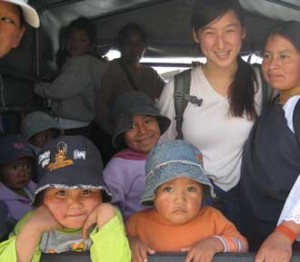
By Andrea Evans
“Morochos! Morochos! Morochos?”
Yes, yes, I nod, I am going to the Morochos. He must be no more than 14, this boy recruiting passengers for a bus. Unlike the Greyhound in Canada, the buses in Ecuador are full-service, with freshly made treats delivered to your seat priced by the centavo, reggaeton music and a complimentary movie (most likely the comically dubbed Karate Kid III). A seat is priced by the minute – 1 centavo per minute, or 1 US$ per hour.
I was hoping the bus would be overflowing so I would have to stand at the door with my feet on the inside,
my hands holding the handlebars on the outside, and my head hanging out as the bus swerved over and around the great Andean mountains. But this time I settle to squish in the aisle as children sit on my backpack. The boy asks me where I am headed – I say Chilcapamba. Really! Do you have a place to stay? He now has a curious look because it is an indigenous community not frequented by tourists. I tell him yes, I have some people waiting for me.
…But before I tell you why I am headed to Chilcapamba, I must tell you how I got here.
Four years ago, I met a man who, by the tilt of his sombrero, I could tell was a unique individual. If you ever have the privilege of meeting Alfonso, a respected indigenous leader, you’ll understand what I mean. He took me on an exquisite ride up snowcapped volcanoes in his truck and while his youngest son was on my lap, recounted the troubles of his people. In that conversation I learned more about global health, and family, than I ever can through textbooks.
When I met him I was volunteering at the local hospital. There is one moment that hangs in my memory
like a painting. It is a picture of the pediatric ward full of silent babies with their equally quiet mothers sitting and waiting by their sides. In the corner, an indigenous mother is in her colourful dress staring blankly at the wall and eating her baby’s food, while her daughter lies flat and floppy behind her. This scene and Alfonso’s stories are the reasons I went back and then went back again.
“Se queda!” This time I’m the one yelling, putting effort into sounding commanding over the reggaeton.
Getting off the bus requires a bit of practice – to tactfully work through the crowd in the aisle paying
careful attention to the farming equipment they bear, to dig out your bag now under sacks of
potatoes, and to jump out of the bus while it is still rolling.
I land in front of Alfonso’s house and soon see four children, two dogs, a piglet, and a chick are headed in
my direction, each making a different gleeful sound. I play with this bunch of friends representing the
carefree, content, and welcoming culture of this community. When Alfonso and his sister, Juana, come
home we exchange warm greetings. We sit down in the kitchen for a meal of quinoa soup, tostados and stories, then gradually start to discuss business. They tell me about how the focus groups amongst the women we set up together had continued over the year, how they are ready to work on the next step of our project.
You see, together we organized meetings amongst the women in the community to address health
needs – and in these meetings the silent mother I saw in the hospital so many years ago gained a resounding voice. In collaboration with the local hospital, under the community’s leadership, and with organized research support from the Faculty of Medicine, these meetings and research continue on from year to year, handed down from one medical student to another. After me, another student will be going to Chilcapamba.
The success of this project leads me to believe that the human touch may prove to be one of the most powerful tools in global health.
Andrea Evans is a second year medical student in the Faculty of Medicine at McGill and founder of McGill Medicine to Chilcapamba, a participatory research project in the Department of Family Medicine and Participatory Research At McGill (PRAM). For more information on the project, feel free to contact
andrea.evans@mail.mcgill.ca.
